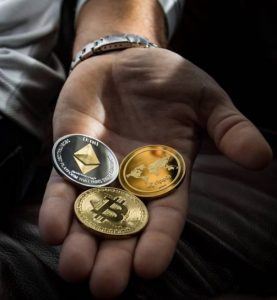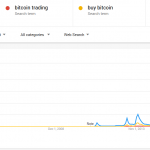Blockchain Statistics 2022-2021
- Global blockchain spending will reach $11.7 billion in 2022.
- North America has the highest market share of blockchain services in 2022.
- At the end of 2021, there were 80,025,125 blockchain wallet users.
- Blockchain technology is about to provide legal ID to 1.1 billion people.
- IBM is working on over 500 blockchain projects.
- 44% of gamers buy or trade items using blockchain technology.
- By 2025, 55%^ of healthcare applications will have adopted blockchain technology.
- In America, 89% of adults have heard of bitcoin.
- Worldwide, blockchain results in a 20% price reduction for consumers booking tickets.

blockchain statistics 2022-2021
Blockchain Facts 2022-2021
Global blockchain adoption is increasing rapidly. Various industries are expected to spend $11.7 billion on solutions in 2022. A report by International Data Corp. says the financial sector, especially the cross-border payment processing industry, will lead the way. Surprisingly, the real estate sector is a close second. Blockchain technology has enabled global commercial and residential real estate investors to buy and sell securely. Healthcare is a close third, followed by the education and retail sectors. The United States will lead the was in global spending for solutions, followed by Western Europe and then China.
With the rising demand for blockchain, North America will have the highest market share of blockchain platforms services for 2022, and up to 2026. One of the reasons is the market is led by AWS, Microsoft, IBM, Oracle and other North American players. These companies, and others, are developing many non-cryptocurrency uses for blockchain technology. Some recent developments include cloud-based blockchain-as-a-service to develop new applications for customers. These developments take major amounts of capital, something North American countries can provide more easily.
The world had 80,025,125 blockchain wallet users at the end of 2021. As the number of bitcoin and other cryptocurrency users grow, the use of blockchain wallets grows exponentially. The number of wallet users is expected to keep growing as consumers are concerned with privacy. More industries are accepting digital payments and consumers are increasingly understanding how secure their information is in a wallet. Coinbase is by far the most popular wallet app, but there are many others. Each supports a varying degree of cryptocurrencies and has its own level of security. Mobile wallets are the most popular.
Microsoft Corp. and Accenture Plc are teaming up to help provide 1.1 billion people identification using blockchain technology. The companies are working on a United Nations-supported project to help people with no official documents, such as refugees and illegal aliens. Blockchain technology will help people obtain official records that can help them access services like healthcare and education. The UN’s goal is to have everyone on the planet have a legal identification that they can use when they are forced to flee their home without their documents. Blockchain technology is making a secure digital ID with biometric information possible.
IBM has 15.000 employees working on 500 projects in the blockchain. IBM has previously shown an interest in embracing new technology, so it’s no surprise. They understand blockchain is an unchangeable shared digital ledger that has more uses than just for cryptocurrency transactions. IBM is especially interested in applications for the financial, healthcare and shipping sectors. IBM Blockchain is working with customers to determine what they need and creating pilot applications. IBM is also a member of HyperLedger, a forum for companies in various industries who want to work together to develop new blockchain technologies. Some of the 15,000 employees are also developing new technologies that B2B consumers don’t even know they need yet.
Gamers are embracing blockchain technology in record numbers compared to other consumers. 44%^ of them have used the technology to buy or trade items within games. Gamers are notorious for adopting new technology, such as virtual and augmented reality. They are usually tech-savvy individuals who understand the addition of NFTS, or non-fungible tokens, into gaming franchises. Gamers can unlock a rare skin or card and resell it, so they monetize their passion. Gamers are the ideal audience for collectible digital content related to their favorite game.
In 2025, 55% of all healthcare applications will use blockchain technology. The healthcare industry can benefit from blockchain technology in many ways. With a standard data format, care communication is so much easier. Many conditions require teams to coordinate; blockchain makes this more efficient. Blockchain technology is also more secure; the recent spate of malware attacks left many institutions vulnerable. Some of the largest healthcare insurers are working to improve the quality of data in healthcare. One of the main hurdles is storage space for massive amounts of data, including medical records, lab reports, payment information and more.
Of all the adults in America, 89% have heard of bitcoin. The blockchain was invented by bitcoin, which introduced the technology as a public transaction ledger. Before bitcoin, no one ever heard of the blockchain. It’s only been 10 years, but the blockchain took off in unexpected ways. Blockchains are popular for their role in cryptocurrencies, but so many industries can benefit from a guarantee of secure record of transactions can benefit so many industries. As more people become familiar with bitcoin, the more of the public will understand the blockchain, its cryptography and its many benefits. While not everyone who has heard of bitcoin understands decentralized blockchains are immutable, this will come in time.
Consumers who book tickets online see a 20% reduction in costs with blockchain technology. The COVID-19 pandemic hurt the travel industry badly, so anything that can help the sector cut costs is essential. An Ethereum-based blockchain powers Russia’s S7 Airlines when they sell tickets. Settlement times are now 23 seconds, down from 14 days. For hotels, blockchain technology has enabled hotels to cut down on bookings from online travel agents, thus eliminating their 10-to-30% commissions. Guests are the ones that reap the benefits.




